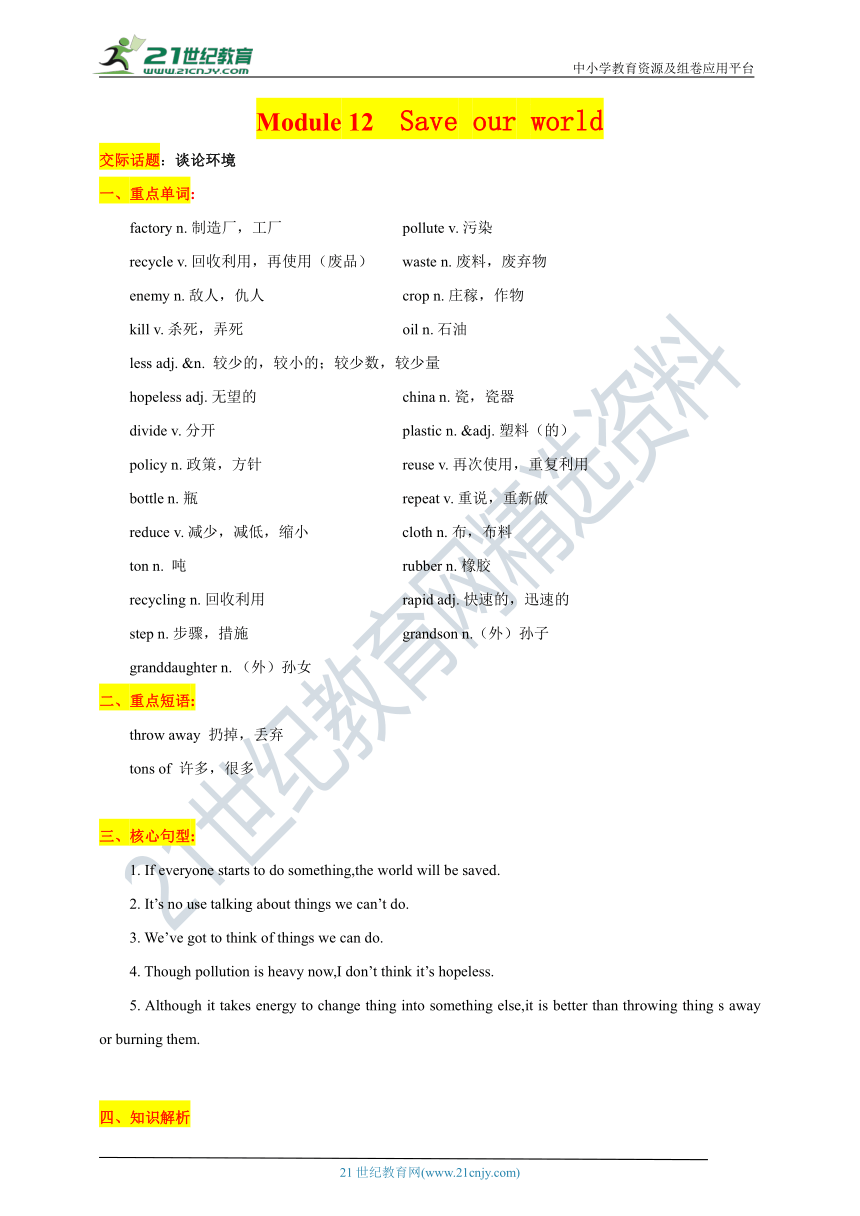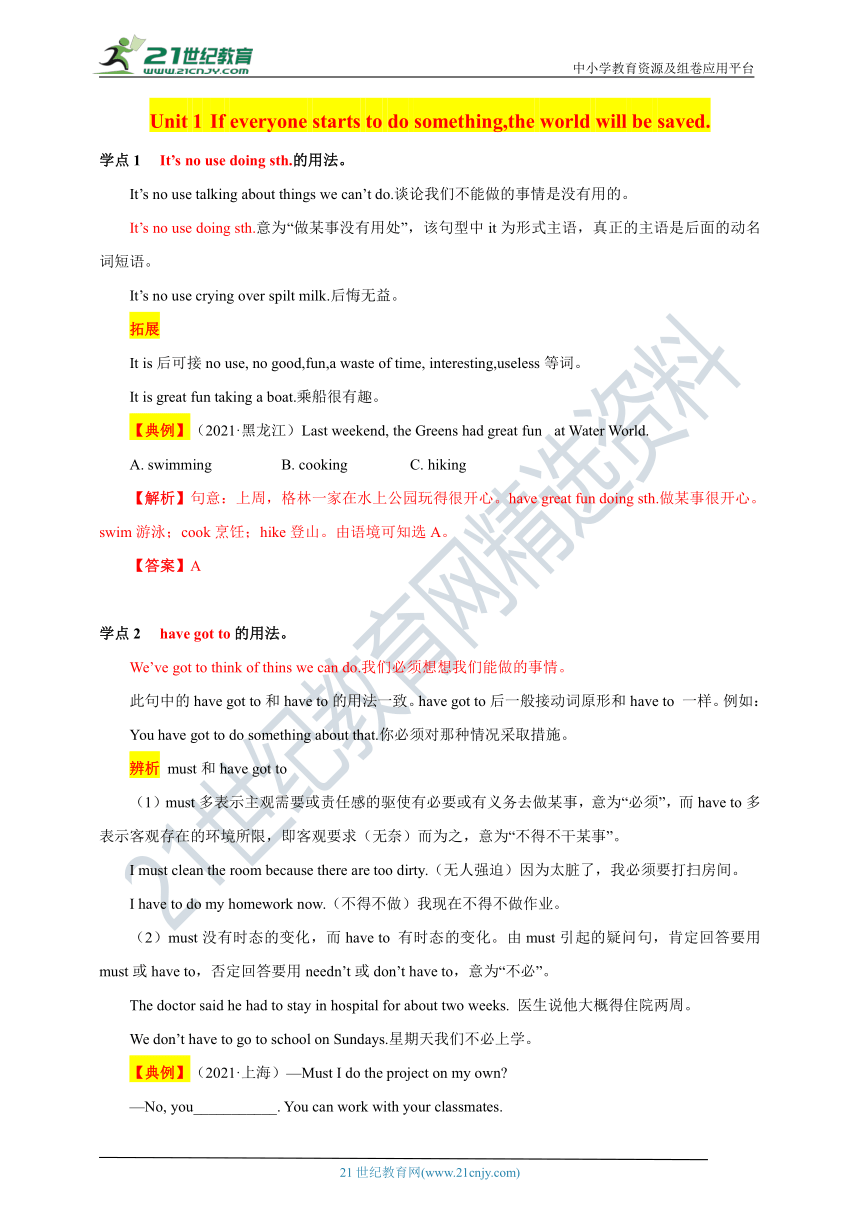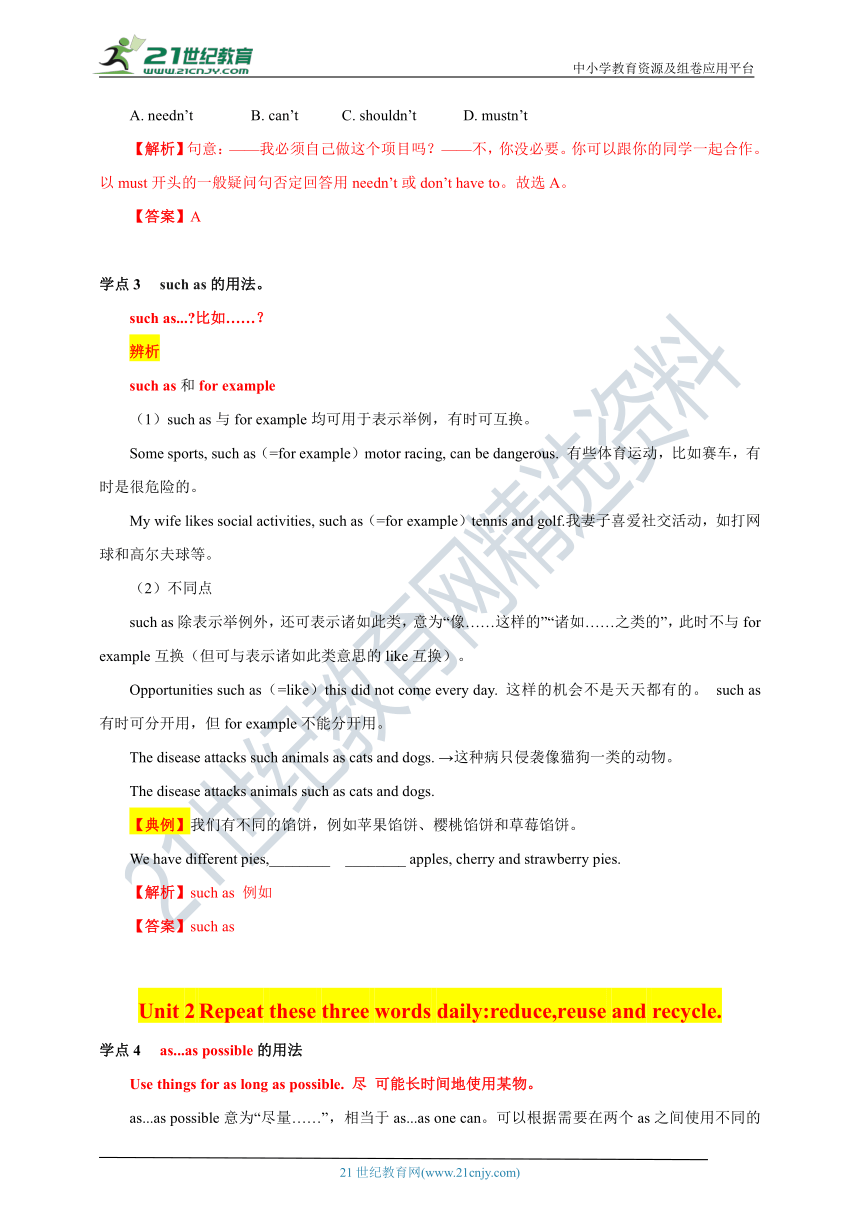Module 12 Save our world精讲学案
文档属性
| 名称 | Module 12 Save our world精讲学案 |  | |
| 格式 | doc | ||
| 文件大小 | 1.2MB | ||
| 资源类型 | 试卷 | ||
| 版本资源 | 外研版 | ||
| 科目 | 英语 | ||
| 更新时间 | 2021-09-01 06:38:22 | ||
图片预览



文档简介
中小学教育资源及组卷应用平台
Module
12
Save
our
world
交际话题:谈论环境
一、重点单词:
factory?n.?制造厂,工厂
pollute?v.?污染
recycle?v.?回收利用,再使用(废品)
waste?n.?废料,废弃物
enemy?n.?敌人,仇人
crop?n.?庄稼,作物
kill?v.?杀死,弄死
oil?n.?石油
less
adj.
&n.
较少的,较小的;较少数,较少量
hopeless?adj.?无望的
china?n.?瓷,瓷器
divide
v.?分开
plastic?n.?&adj.?塑料(的)
policy?n.?政策,方针
reuse?v.?再次使用,重复利用
bottle?n.?瓶
repeat?v.?重说,重新做
reduce?v.?减少,减低,缩小
cloth?n.?布,布料
ton
n.
吨
rubber
n.?橡胶
recycling?n.?回收利用
rapid?adj.?快速的,迅速的
step?n.?步骤,措施
grandson?n.(外)孙子
granddaughter?n.?(外)孙女
二、重点短语:
throw
away
扔掉,丢弃
tons
of
许多,很多
三、核心句型:
1.
If?everyone?starts?to?do?something,the?world?will?be?saved.
2.
It’s?no?use?talking?about?things?we?can’t?do.
3.
We’ve
got
to
think
of
things
we
can
do.
4.
Though
pollution
is
heavy
now,I
don’t
think
it’s
hopeless.
5.
Although
it
takes
energy
to
change
thing
into
something
else,it
is
better
than
throwing
thing
s
away
or
burning
them.
四、知识解析
Unit
1
If
everyone
starts
to
do
something,the
world
will
be
saved.
学点1
It’s
no
use
doing
sth.的用法。
It’s
no
use
talking
about
things
we
can’t
do.谈论我们不能做的事情是没有用的。
It’s
no
use
doing
sth.意为“做某事没有用处”,该句型中it为形式主语,真正的主语是后面的动名词短语。
It’s
no
use
crying
over
spilt
milk.后悔无益。
拓展
It
is后可接no
use,
no
good,fun,a
waste
of
time,
interesting,useless等词。
It
is
great
fun
taking
a
boat.乘船很有趣。
【典例】(2021·黑龙江)Last
weekend,
the
Greens
had
great
fun
at
Water
World.
A.
swimming
B.
cooking
C.
hiking
【解析】句意:上周,格林一家在水上公园玩得很开心。have
great
fun
doing
sth.做某事很开心。swim游泳;cook烹饪;hike登山。由语境可知选A。
【答案】A
学点2
have
got
to的用法。
We’ve
got
to
think
of
thins
we
can
do.我们必须想想我们能做的事情。
此句中的have
got
to和have
to的用法一致。have
got
to后一般接动词原形和have
to
一样。例如:
You
have
got
to
do
something
about
that.你必须对那种情况采取措施。
辨析
must和have
got
to
(1)must多表示主观需要或责任感的驱使有必要或有义务去做某事,意为“必须”,而have
to多表示客观存在的环境所限,即客观要求(无奈)而为之,意为“不得不干某事”。
I
must
clean
the
room
because
there
are
too
dirty.(无人强迫)因为太脏了,我必须要打扫房间。
I
have
to
do
my
homework
now.(不得不做)我现在不得不做作业。
(2)must没有时态的变化,而have
to
有时态的变化。由must引起的疑问句,肯定回答要用must或have
to,否定回答要用needn’t或don’t
have
to,意为“不必”。
The
doctor
said
he
had
to
stay
in
hospital
for
about
two
weeks.
医生说他大概得住院两周。
We
don’t
have
to
go
to
school
on
Sundays.星期天我们不必上学。
【典例】(2021·上海)—Must
I
do
the
project
on
my
own?
—No,
you___________.
You
can
work
with
your
classmates.
A.
needn’t
B.
can’t
C.
shouldn’t
D.
mustn’t
【解析】句意:——我必须自己做这个项目吗?——不,你没必要。你可以跟你的同学一起合作。以must开头的一般疑问句否定回答用needn’t或don’t
have
to。故选A。
【答案】A
学点3
such
as的用法。
such
as...?比如……?
辨析
such
as和for
example
(1)such
as与for
example均可用于表示举例,有时可互换。
Some
sports,
such
as(=for
example)motor
racing,
can
be
dangerous.
有些体育运动,比如赛车,有时是很危险的。
My
wife
likes
social
activities,
such
as(=for
example)tennis
and
golf.我妻子喜爱社交活动,如打网球和高尔夫球等。
(2)不同点
such
as除表示举例外,还可表示诸如此类,意为“像……这样的”“诸如……之类的”,此时不与for
example互换(但可与表示诸如此类意思的like互换)。
Opportunities
such
as(=like)this
did
not
come
every
day.
这样的机会不是天天都有的。
such
as有时可分开用,但for
example不能分开用。
The
disease
attacks
such
animals
as
cats
and
dogs.
→这种病只侵袭像猫狗一类的动物。
The
disease
attacks
animals
such
as
cats
and
dogs.
【典例】我们有不同的馅饼,例如苹果馅饼、樱桃馅饼和草莓馅饼。
We
have
different
pies,________
________
apples,
cherry
and
strawberry
pies.
【解析】such
as
例如
【答案】such
as
Unit
2
Repeat
these
three
words
daily:reduce,reuse
and
recycle.
学点4
as...as
possible的用法
Use
things
for
as
long
as
possible.
尽
可能长时间地使用某物。
as...as
possible意为“尽量……”,相当于as...as
one
can。可以根据需要在两个as之间使用不同的形容词或副词。
Miss
Gao
got
a
medicine
box
as
quickly
as
possible.高老师尽快地拿到了药箱。
【典例】(2021·江苏)The
local
guide
spoke______she
could
to
make
the
visitors
understand
her.
A.
as
clear
as
B.
as
clearly
as
C.
so
clear
as
D.
so
clearly
as
【解析】句意:这个当地导游尽可能地将清洗让游客们可以理解她。as...as...尽可能地;so...as用于否定句中,故排除C、D;此处修饰动词spoke需用副词clearly。故选B。
【答案】B
Unit
3
Language
in
use
学点5
pay
attention
to的用法
If
we
pay
attention
to
pollution
now,the
future
will
be
hopeful.
如果我们现在注意污染,未来将会充满希望。
pay
attention
to
意为“注意”,后面可以直接加名词、代词或者动名词,此处to是一个介词,并不是能构成动词不定式。例如:
We
had
paid
attention
to
him.
我们已经注意到他了。
They
paid
attention
to
watching
the
scene.
他们注意到了观察现场。
拓展
类似的用法还有:look
forward
to(期待),be
used
to(习惯于)等。
【典例】(2021·宜宾)We
all
look
forward
to
you
again
soon.
A.
see
B.
seeing
C.
seen
【解析】句意:我们都期待可以很快地再次见面。look
forward
to意为“期待;盼望”,其中to为介词,后接动词-ing形式。故选B。
【答案】B
五、核心语法
构词法——派生法
本模块主要学习在词根前面加前缀或在词根后面加后缀构成新单词的派生法。
happy—unhappy(加前缀un-)
happy—happily(加后缀-ly)
前缀一般不造成词类的转换,但能引起词义的变化。前缀中有相当一部分可构成反义词。常用的前缀有:
re-含有“再;重复”之意:re+use
reuse再利用
Re+cycle
recycle
再回收
un-含有“不;未;非;反”之意:
un+usual
unusual不寻常的
un+happy
unhappy
不快乐的
dis-含有“不;无;非”之意:
dis+like
dislike不喜欢
dis+advantage
disadvantage不利条件
通过加后缀构成另一个词。后缀不仅能改变词义,也能改变词类。常用的后缀有:
-ful加在名词后构成形容词,表示“有……性质的”。
hope+-ful
hopeful有希望的
help+-ful
helpful有帮助的
-less加在名词后构成形容词,表示“无……的”。
hope+-less
hopeless没有希望的
help+-less
helpless无用的
-able加在动词后构成形容词,表示“能……的”。
enjoy+-able
enjoyable
令人愉快的
reuse+-able
reusable
可再次使用的
核心素养在线
本模块的话题是环境保护,通过本模块的学习旨在培养学生的环境保护意识,
使环境更适合人类工作和劳动的需要。这就涉及到人们的衣、食、住、行、玩的方方面面,都要符合科学、卫生、健康、绿色的要求。这个层面属于微观的,既要靠公民的自觉行动,又要依靠政府的政策法规作保证,依靠社区的组织教育来引导,
要工农兵学商各行各业齐抓共管,才能解决。
(2021·河南)
he,
happy,
baby,
save,
arm,
volunteer,
clean,
quick,
work,
turn
Wang
Ping
is
a
cleaner.
He
has
1.
worked
in
a
park
for
5
years.
He
is
also
a
good
father.
Nothing
can
make
him
2.
happier
than
playing
with
his
little
daughter
in
his
free
time.
Last
Tuesday
afternoon,
while
he
was
3.
cleaning
the
park,
suddenly,
he
heard
a
woman
crying
for
help.
He
ran
up
4.
quickly
to
see
what
happened.
The
woman’s
15-month-
old
baby
girl
choked(窒息)on
a
small
piece
of
pear
and
her
face
5.
turned
purple.
The
baby
was
too
young
to
save
herself,
and
the
mother
was
so
nervous
that
she
didn’t
know
how
to
save
her
daughter
properly.
Luckily,
Wang
Ping
knew
what
to
do.
He
took
the
baby
in
his
6.
arm(s)
without
thinking
twice.
With
the
mother’s
help,
Wang
Ping
held
the
baby
upside
down
and
gave
her
a
few
pats(轻拍)on
the
back.
After
a
short
while,
he
succeeded
in
getting
the
piece
of
pear
out
of
her
mouth.
and
the
baby
began
to
cry.
Her
mom
was
so
thankful
because
her
daughter
was
7.
saved.
Wang
Ping
tried
his
best
and
saved
the
8.
baby’s
life.
In
his
mind,
helping
others
is
just
helping
9.
himself
.
He
hoped
more
people
could
10.
volunteer
to
help
the
people
in
need
if
possible.
1.worked
句意:他在那个公园工作五年了。根据题干中的时间段可知此处需用现在完成时。故填worked。
2.happier
句意:在她空闲时间,没有什么比跟他的小女儿一起玩耍让他更快乐。由空后的than可知,此处需用比较级形式。happy的比较级形式为happier。
3.cleaning
句意:上周二下午,她正在打扫公园的时候,突然听到一个女人在哭喊着寻求帮助。表示“正在做某事”,
需用进行时,故填cleaning。
4.quickly
句意:他匆忙跑过去看发生了什么。修饰动词用副词quickly
5.turned
由空前的15-month-old
baby
girl
choked
(窒息)
on
a
small
piece
of
pear
可知此处指“脸色变紫”,且结合上下文语境此处需用一般过去时。故填turned。
6.arm(s)句意:她他毫不犹豫地把孩子抱起来。in
one’s
arm(s)被搂在怀里。
7.saved
句意:她妈妈是如此的赶紧因为t她女儿被救了。表示“某人被救”需用被动语态
was
saved。
8.baby’s
句意:王平尽力拯救那个小孩的生命。save
one’s
life拯救某人的生命。
9.himself
句意:在他的脑海中,拯救别人就是拯救自己。表示“某人自己”需用反身代词。故此处填himself。
10.
volunteer
句意:他希望更多的人如果有可能的话去帮助需要帮助的人。volunteer志愿。
21世纪教育网
www.21cnjy.com
精品试卷·第
2
页
(共
2
页)
HYPERLINK
"http://21世纪教育网(www.21cnjy.com)
"
21世纪教育网(www.21cnjy.com)
Module
12
Save
our
world
交际话题:谈论环境
一、重点单词:
factory?n.?制造厂,工厂
pollute?v.?污染
recycle?v.?回收利用,再使用(废品)
waste?n.?废料,废弃物
enemy?n.?敌人,仇人
crop?n.?庄稼,作物
kill?v.?杀死,弄死
oil?n.?石油
less
adj.
&n.
较少的,较小的;较少数,较少量
hopeless?adj.?无望的
china?n.?瓷,瓷器
divide
v.?分开
plastic?n.?&adj.?塑料(的)
policy?n.?政策,方针
reuse?v.?再次使用,重复利用
bottle?n.?瓶
repeat?v.?重说,重新做
reduce?v.?减少,减低,缩小
cloth?n.?布,布料
ton
n.
吨
rubber
n.?橡胶
recycling?n.?回收利用
rapid?adj.?快速的,迅速的
step?n.?步骤,措施
grandson?n.(外)孙子
granddaughter?n.?(外)孙女
二、重点短语:
throw
away
扔掉,丢弃
tons
of
许多,很多
三、核心句型:
1.
If?everyone?starts?to?do?something,the?world?will?be?saved.
2.
It’s?no?use?talking?about?things?we?can’t?do.
3.
We’ve
got
to
think
of
things
we
can
do.
4.
Though
pollution
is
heavy
now,I
don’t
think
it’s
hopeless.
5.
Although
it
takes
energy
to
change
thing
into
something
else,it
is
better
than
throwing
thing
s
away
or
burning
them.
四、知识解析
Unit
1
If
everyone
starts
to
do
something,the
world
will
be
saved.
学点1
It’s
no
use
doing
sth.的用法。
It’s
no
use
talking
about
things
we
can’t
do.谈论我们不能做的事情是没有用的。
It’s
no
use
doing
sth.意为“做某事没有用处”,该句型中it为形式主语,真正的主语是后面的动名词短语。
It’s
no
use
crying
over
spilt
milk.后悔无益。
拓展
It
is后可接no
use,
no
good,fun,a
waste
of
time,
interesting,useless等词。
It
is
great
fun
taking
a
boat.乘船很有趣。
【典例】(2021·黑龙江)Last
weekend,
the
Greens
had
great
fun
at
Water
World.
A.
swimming
B.
cooking
C.
hiking
【解析】句意:上周,格林一家在水上公园玩得很开心。have
great
fun
doing
sth.做某事很开心。swim游泳;cook烹饪;hike登山。由语境可知选A。
【答案】A
学点2
have
got
to的用法。
We’ve
got
to
think
of
thins
we
can
do.我们必须想想我们能做的事情。
此句中的have
got
to和have
to的用法一致。have
got
to后一般接动词原形和have
to
一样。例如:
You
have
got
to
do
something
about
that.你必须对那种情况采取措施。
辨析
must和have
got
to
(1)must多表示主观需要或责任感的驱使有必要或有义务去做某事,意为“必须”,而have
to多表示客观存在的环境所限,即客观要求(无奈)而为之,意为“不得不干某事”。
I
must
clean
the
room
because
there
are
too
dirty.(无人强迫)因为太脏了,我必须要打扫房间。
I
have
to
do
my
homework
now.(不得不做)我现在不得不做作业。
(2)must没有时态的变化,而have
to
有时态的变化。由must引起的疑问句,肯定回答要用must或have
to,否定回答要用needn’t或don’t
have
to,意为“不必”。
The
doctor
said
he
had
to
stay
in
hospital
for
about
two
weeks.
医生说他大概得住院两周。
We
don’t
have
to
go
to
school
on
Sundays.星期天我们不必上学。
【典例】(2021·上海)—Must
I
do
the
project
on
my
own?
—No,
you___________.
You
can
work
with
your
classmates.
A.
needn’t
B.
can’t
C.
shouldn’t
D.
mustn’t
【解析】句意:——我必须自己做这个项目吗?——不,你没必要。你可以跟你的同学一起合作。以must开头的一般疑问句否定回答用needn’t或don’t
have
to。故选A。
【答案】A
学点3
such
as的用法。
such
as...?比如……?
辨析
such
as和for
example
(1)such
as与for
example均可用于表示举例,有时可互换。
Some
sports,
such
as(=for
example)motor
racing,
can
be
dangerous.
有些体育运动,比如赛车,有时是很危险的。
My
wife
likes
social
activities,
such
as(=for
example)tennis
and
golf.我妻子喜爱社交活动,如打网球和高尔夫球等。
(2)不同点
such
as除表示举例外,还可表示诸如此类,意为“像……这样的”“诸如……之类的”,此时不与for
example互换(但可与表示诸如此类意思的like互换)。
Opportunities
such
as(=like)this
did
not
come
every
day.
这样的机会不是天天都有的。
such
as有时可分开用,但for
example不能分开用。
The
disease
attacks
such
animals
as
cats
and
dogs.
→这种病只侵袭像猫狗一类的动物。
The
disease
attacks
animals
such
as
cats
and
dogs.
【典例】我们有不同的馅饼,例如苹果馅饼、樱桃馅饼和草莓馅饼。
We
have
different
pies,________
________
apples,
cherry
and
strawberry
pies.
【解析】such
as
例如
【答案】such
as
Unit
2
Repeat
these
three
words
daily:reduce,reuse
and
recycle.
学点4
as...as
possible的用法
Use
things
for
as
long
as
possible.
尽
可能长时间地使用某物。
as...as
possible意为“尽量……”,相当于as...as
one
can。可以根据需要在两个as之间使用不同的形容词或副词。
Miss
Gao
got
a
medicine
box
as
quickly
as
possible.高老师尽快地拿到了药箱。
【典例】(2021·江苏)The
local
guide
spoke______she
could
to
make
the
visitors
understand
her.
A.
as
clear
as
B.
as
clearly
as
C.
so
clear
as
D.
so
clearly
as
【解析】句意:这个当地导游尽可能地将清洗让游客们可以理解她。as...as...尽可能地;so...as用于否定句中,故排除C、D;此处修饰动词spoke需用副词clearly。故选B。
【答案】B
Unit
3
Language
in
use
学点5
pay
attention
to的用法
If
we
pay
attention
to
pollution
now,the
future
will
be
hopeful.
如果我们现在注意污染,未来将会充满希望。
pay
attention
to
意为“注意”,后面可以直接加名词、代词或者动名词,此处to是一个介词,并不是能构成动词不定式。例如:
We
had
paid
attention
to
him.
我们已经注意到他了。
They
paid
attention
to
watching
the
scene.
他们注意到了观察现场。
拓展
类似的用法还有:look
forward
to(期待),be
used
to(习惯于)等。
【典例】(2021·宜宾)We
all
look
forward
to
you
again
soon.
A.
see
B.
seeing
C.
seen
【解析】句意:我们都期待可以很快地再次见面。look
forward
to意为“期待;盼望”,其中to为介词,后接动词-ing形式。故选B。
【答案】B
五、核心语法
构词法——派生法
本模块主要学习在词根前面加前缀或在词根后面加后缀构成新单词的派生法。
happy—unhappy(加前缀un-)
happy—happily(加后缀-ly)
前缀一般不造成词类的转换,但能引起词义的变化。前缀中有相当一部分可构成反义词。常用的前缀有:
re-含有“再;重复”之意:re+use
reuse再利用
Re+cycle
recycle
再回收
un-含有“不;未;非;反”之意:
un+usual
unusual不寻常的
un+happy
unhappy
不快乐的
dis-含有“不;无;非”之意:
dis+like
dislike不喜欢
dis+advantage
disadvantage不利条件
通过加后缀构成另一个词。后缀不仅能改变词义,也能改变词类。常用的后缀有:
-ful加在名词后构成形容词,表示“有……性质的”。
hope+-ful
hopeful有希望的
help+-ful
helpful有帮助的
-less加在名词后构成形容词,表示“无……的”。
hope+-less
hopeless没有希望的
help+-less
helpless无用的
-able加在动词后构成形容词,表示“能……的”。
enjoy+-able
enjoyable
令人愉快的
reuse+-able
reusable
可再次使用的
核心素养在线
本模块的话题是环境保护,通过本模块的学习旨在培养学生的环境保护意识,
使环境更适合人类工作和劳动的需要。这就涉及到人们的衣、食、住、行、玩的方方面面,都要符合科学、卫生、健康、绿色的要求。这个层面属于微观的,既要靠公民的自觉行动,又要依靠政府的政策法规作保证,依靠社区的组织教育来引导,
要工农兵学商各行各业齐抓共管,才能解决。
(2021·河南)
he,
happy,
baby,
save,
arm,
volunteer,
clean,
quick,
work,
turn
Wang
Ping
is
a
cleaner.
He
has
1.
worked
in
a
park
for
5
years.
He
is
also
a
good
father.
Nothing
can
make
him
2.
happier
than
playing
with
his
little
daughter
in
his
free
time.
Last
Tuesday
afternoon,
while
he
was
3.
cleaning
the
park,
suddenly,
he
heard
a
woman
crying
for
help.
He
ran
up
4.
quickly
to
see
what
happened.
The
woman’s
15-month-
old
baby
girl
choked(窒息)on
a
small
piece
of
pear
and
her
face
5.
turned
purple.
The
baby
was
too
young
to
save
herself,
and
the
mother
was
so
nervous
that
she
didn’t
know
how
to
save
her
daughter
properly.
Luckily,
Wang
Ping
knew
what
to
do.
He
took
the
baby
in
his
6.
arm(s)
without
thinking
twice.
With
the
mother’s
help,
Wang
Ping
held
the
baby
upside
down
and
gave
her
a
few
pats(轻拍)on
the
back.
After
a
short
while,
he
succeeded
in
getting
the
piece
of
pear
out
of
her
mouth.
and
the
baby
began
to
cry.
Her
mom
was
so
thankful
because
her
daughter
was
7.
saved.
Wang
Ping
tried
his
best
and
saved
the
8.
baby’s
life.
In
his
mind,
helping
others
is
just
helping
9.
himself
.
He
hoped
more
people
could
10.
volunteer
to
help
the
people
in
need
if
possible.
1.worked
句意:他在那个公园工作五年了。根据题干中的时间段可知此处需用现在完成时。故填worked。
2.happier
句意:在她空闲时间,没有什么比跟他的小女儿一起玩耍让他更快乐。由空后的than可知,此处需用比较级形式。happy的比较级形式为happier。
3.cleaning
句意:上周二下午,她正在打扫公园的时候,突然听到一个女人在哭喊着寻求帮助。表示“正在做某事”,
需用进行时,故填cleaning。
4.quickly
句意:他匆忙跑过去看发生了什么。修饰动词用副词quickly
5.turned
由空前的15-month-old
baby
girl
choked
(窒息)
on
a
small
piece
of
pear
可知此处指“脸色变紫”,且结合上下文语境此处需用一般过去时。故填turned。
6.arm(s)句意:她他毫不犹豫地把孩子抱起来。in
one’s
arm(s)被搂在怀里。
7.saved
句意:她妈妈是如此的赶紧因为t她女儿被救了。表示“某人被救”需用被动语态
was
saved。
8.baby’s
句意:王平尽力拯救那个小孩的生命。save
one’s
life拯救某人的生命。
9.himself
句意:在他的脑海中,拯救别人就是拯救自己。表示“某人自己”需用反身代词。故此处填himself。
10.
volunteer
句意:他希望更多的人如果有可能的话去帮助需要帮助的人。volunteer志愿。
21世纪教育网
www.21cnjy.com
精品试卷·第
2
页
(共
2
页)
HYPERLINK
"http://21世纪教育网(www.21cnjy.com)
"
21世纪教育网(www.21cnjy.com)
同课章节目录
- Module 1 Wonders of the world
- Unit 1 It's more than 2,000 years old.
- Unit 2 The Grand Canyon was not just big.
- Unit 3 Language in use
- Module 2 Public holidays
- Unit 1 My family always go somewhere interesting a
- Unit 2 We have celebrated the festival since the f
- Unit 3 Language in use
- Module 3 Heroes
- Unit 1 She trained hard,so she became a great play
- Unit 2There were few doctors, so he had to work ve
- Unit 3 Language in use
- Module 4 Home alone
- Unit 1 I can look after myself, although it won’t
- Unit 2 I became so bored with their orders that I
- Unit 3 Language in use
- Module 5 Museums
- Unit 1 Don't cross that rope!
- Unit 2 If you ever go to London, make sure you vis
- Unit 3 Language in use
- Module 6 Problems
- Unit 1 If I start after dinner, I'll finish it be
- Unit 2 If you tell him the truth now, you will sho
- Unit 3 Language in use
- Revision Module A
- Module 7 Great books
- Unit 1 We're still influenced by Confucius's idea
- Unit 2 It is still read and loved.
- Unit 3 Language in use
- Module 8 Sports life
- Unit 1 Daming wasn't chosen for the team last time
- Unit 2 He was invited to competitions around the w
- Unit 3 Language in use
- Module 9 Great inventions
- Unit 1 Will computers be used more than books in t
- Unit 2 Will books be replaced by the Internet?
- Unit 3 Language in use
- Module 10 Australia
- Unit 1 I have some photos that I took in Australia
- Unit 2 The game that they like most is Australian
- Unit 3 Language in use
- Module 11 Photos
- Unit 1 He's the boy who won the photo competition
- Unit 2 The photo which we liked best was taken by
- Unit 3 Language in use
- Module 12 Save our world
- Unit 1 If everyone starts to do something, the wor
- Unit 2 Repeat these three words daily: reduce, reu
- Unit 3 Language in use
- Revision Module B
